The City of Portland says the 2015 Sunday Parkways season will break all previous records for attendance, so it’s fitting that it came to an end on a near-perfect day.
Thousands of people came out on bikes and on their own two feet to enjoy blue skies, cool and sunny temperatures, and the first-ever (and likely the last) Sunday Parkways to use the carfree Tilikum Bridge.
Typical Sunday Parkways routes are one big loop, but with the Tilikum opening just a few weeks ago it was hard for organizers to resist including it in their plans. So today’s ride looped through Westmoreland and Sellwood neighborhoods and then had a long northern spur along the new Orangle Line and up onto the bridge.
Sounds like a great idea, except for the fact that TriMet buses, MAX and streetcar were all on their normal schedules. That alone is no big deal, but when you consider that TriMet is already extremely worried about collisions between path users and trains in inner southeast, you can imagine their stress level today with thousands of Sunday Parkways attendees dawdling around the tracks. I heard from sources that TriMet initially wanted PBOT to use only the north side of the Tilikum path because they didn’t want people to attempt to cross over the tracks at the west end. Then PBOT posted a message to Facebook encouraging people to park their bikes on the east end of the bridge and walk across in order to “keep the congestion down.”
The bridge and traffic along the Orange Line from OMSI to the Brooklyn Neighborhood was packed all day. But a few bottlenecks are a small price to pay for such a great event. Going slow was interesting because it gave me a time to chat with people and watch how the new bikeways, signals and crossings were being used. That being said, I think in the future it might be smarter for them to use larger streets and arterials instead of funneling everyone on narrow paths.
But, I digress… Back to today’s adventures…
Before we started the ride I met up with one Portlander who had never done a Sunday Parkways before. His name is Ted Wheeler. Wheeler, whose currently serving as Oregon State Treasurer and who would like to become Portland’s mayor, showed up to the event with his nine-year-old daughter. Wheeler said he and his family don’t ride in the city. He’s an “avid cyclist” who competes in triathlons and only gets out on the road in the pre-dawn hours because he “doesn’t like to mingle with traffic.” In many ways, he and his daughter are the embodiment of what open streets events are all about: a way to experience city streets on a bike without the threat of dangerous driving.
Looking around at all the other families on bikes rolling by us, Wheeler remarked at how the event impacts our city. “It just shows what the greenway potential is, in terms of bringing the community together, getting people outside, getting people to mingle, and really humanizing our built environment.”
The built environment had plenty of humans in it today that’s for sure…
Advertisement
After rolling through the paths along the Orange Line and then the tree-lined streets of the Brooklyn neighborhood, we stopped at Westmoreland Park for lunch. Along the way we grabbed some fresh veggies from a free pile and scored some fruit thanks to BikeLoudPDX’s “banana handup” at the top of a little hill.
I spotted Mayor Hales at the park. He was proudly sporting the very first of Nutcase’s eagerly-anticipated new helmet featuring the Portland flag.
I always love seeing familiar faces along the road. It’s my favorite part of Sunday Parkways. I talked to tons of old and new friends today.
Here’s Citybikes founder Tim Calvert (who is no longer with the cooperative) riding his trademark tall-bike full of pannier buckets he makes and sells…
This is Angel York, a dedicated volunteer who helps several local bike organizations, including Bike Farm and BikePortland (she’s helping us with our birthday party this Friday!)…
Also ran into this very talented duo: Sprocket Podcast co-host Aaron Flores (L) and consumate activist and musician Dan Kaufman…
And this is BikeLoudPDX volunteer Emily Guise and her friend with their matching Bike Fridays. Sooo cute…
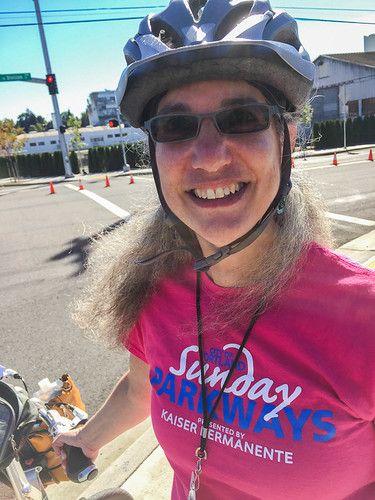
The sweetest thing of the day (literally and figuratively) were these two young ladies selling bicycling-inspired cookies and rice krispie treats…
Free piles are a time-honored Portland tradition, but a free car? That was a first for me:
Another first was spotting this cool little dude on the new mural at SE 8th and Division. I think I found my spirit animal…
Hope everyone had fun out there today. Thanks to the City of Portland, the volunteers and everyone who makes this event tick. We’re already looking forward to next year.



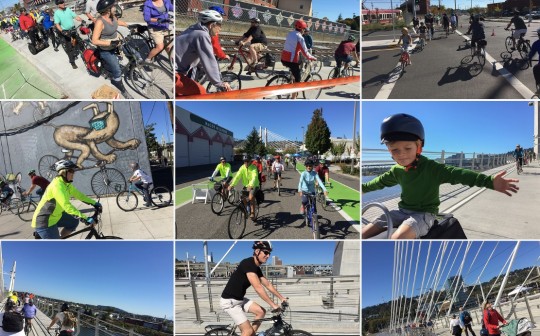



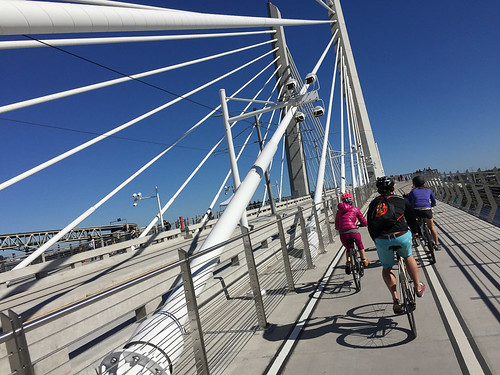
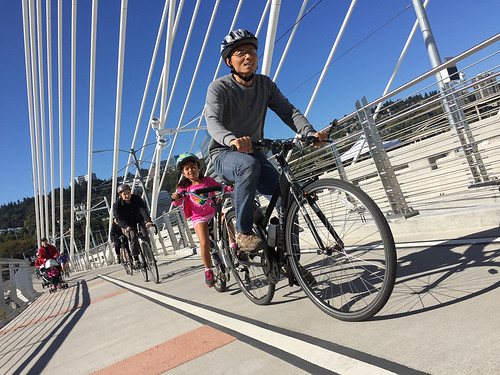
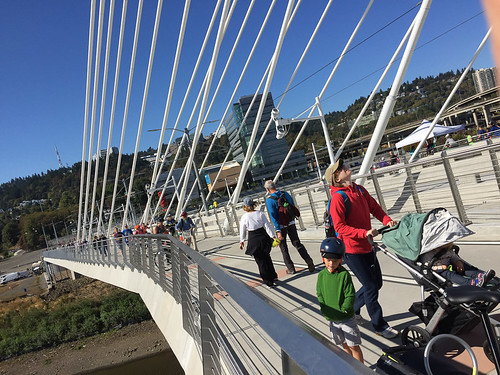
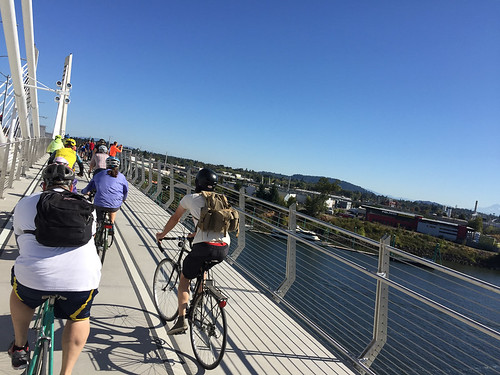
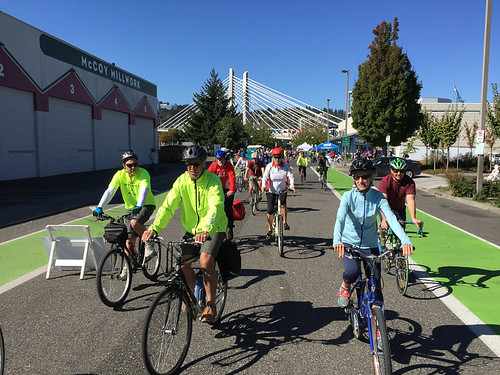
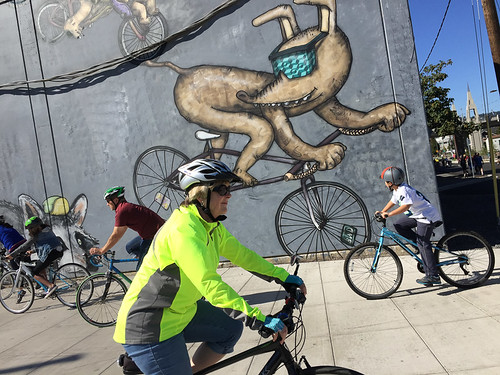
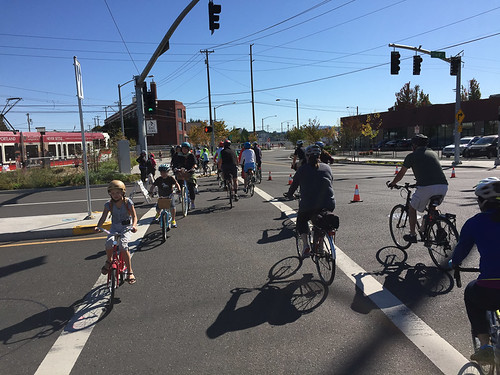
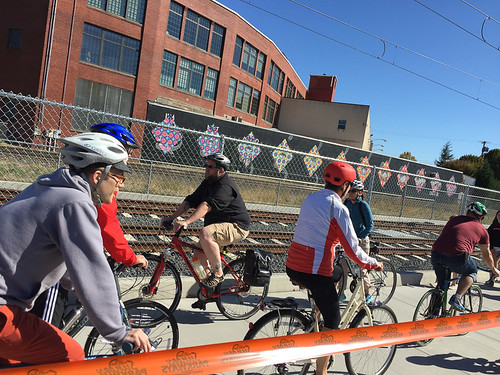

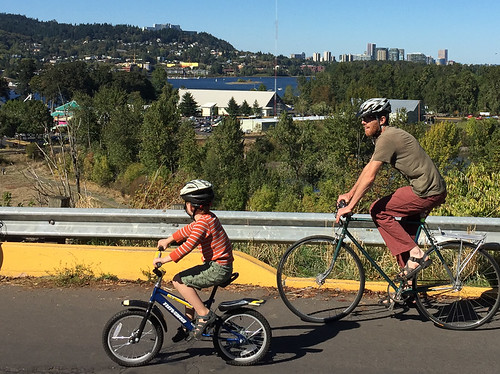
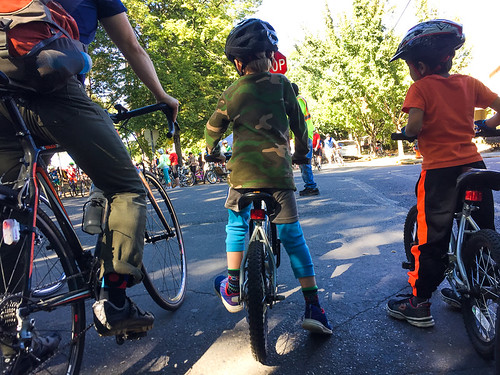
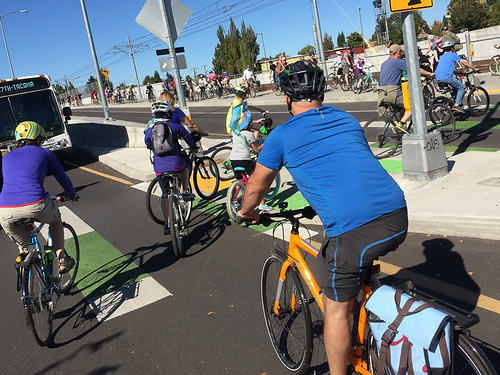
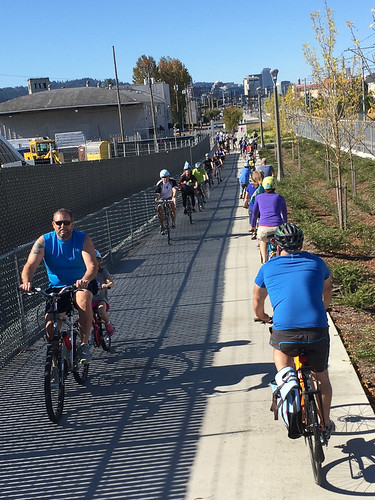
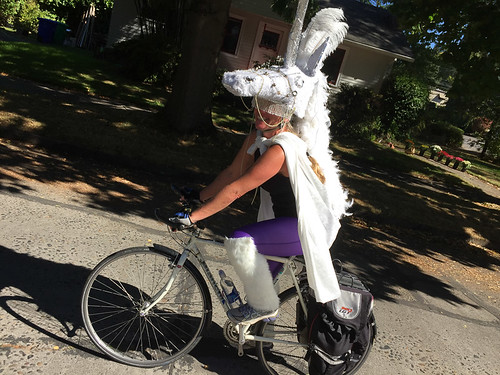
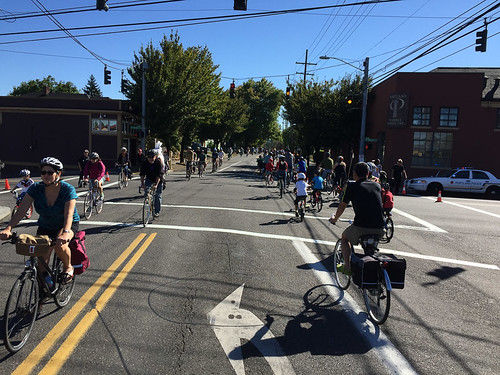
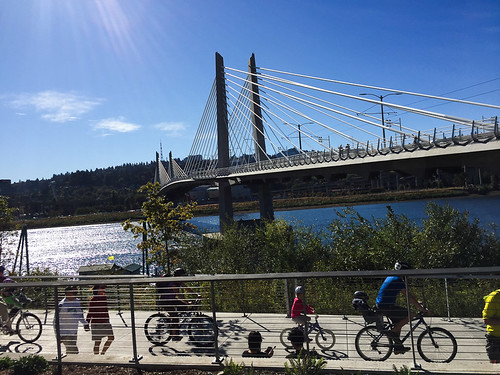
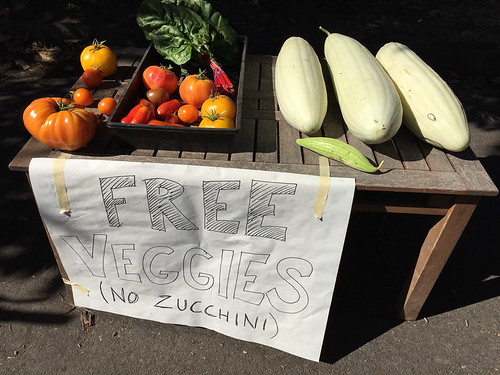
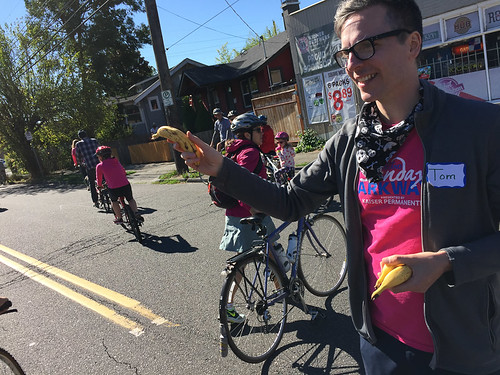
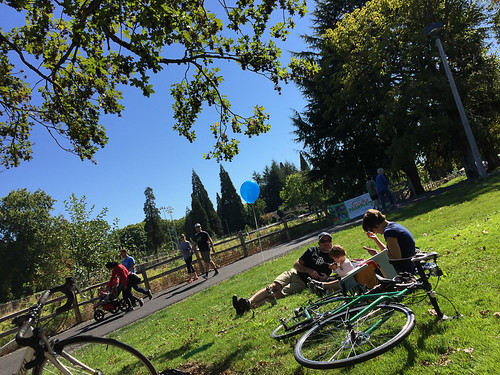
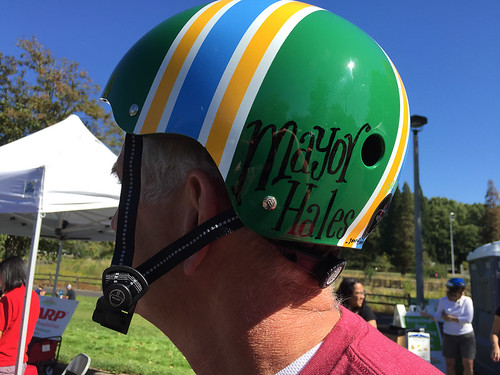
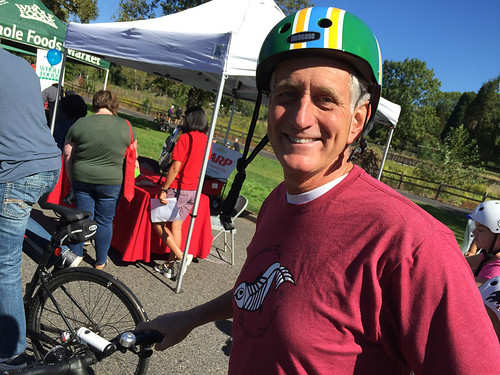
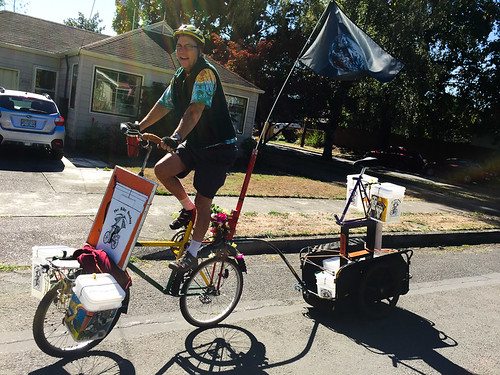
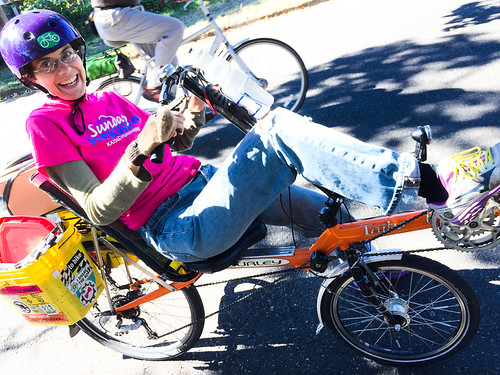
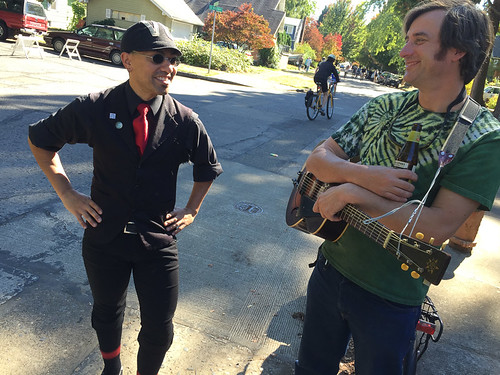
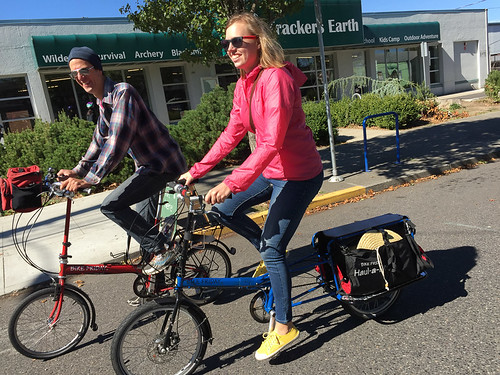
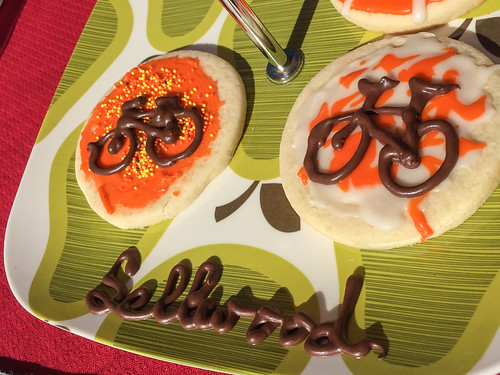
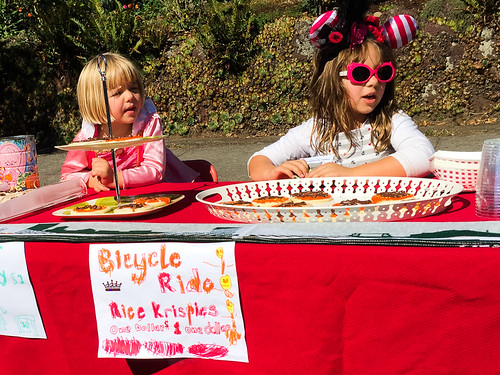
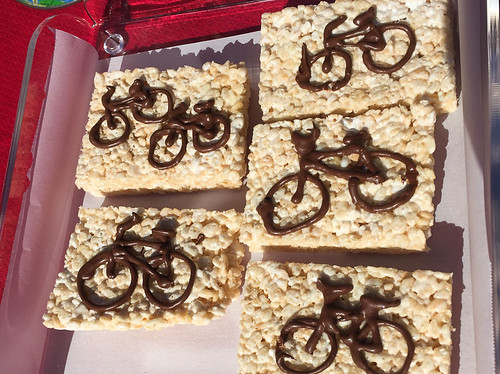
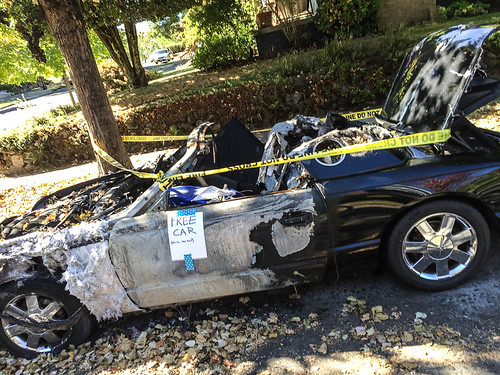
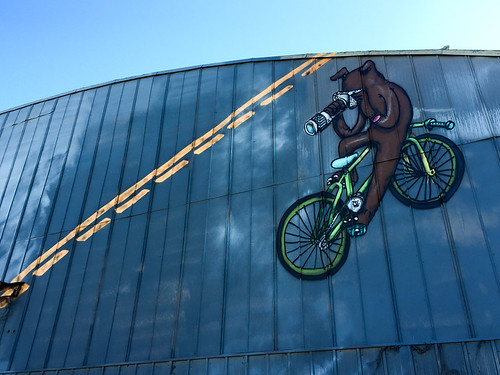
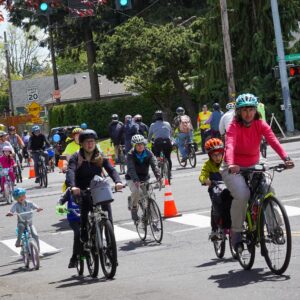

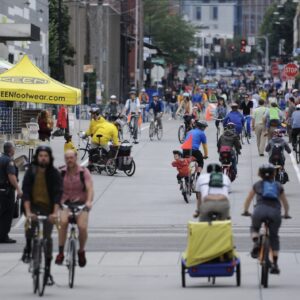

Thanks for reading.
BikePortland has served this community with independent community journalism since 2005. We rely on subscriptions from readers like you to survive. Your financial support is vital in keeping this valuable resource alive and well.
Please subscribe today to strengthen and expand our work.
Jonathan: I was actually kind of surprised to read your statement that this may be the only Sunday Parkways to include the Tilikum Crossing. It seems SO worth it to me for Tilikum to be part of the route. Yes, it can be traveled car-free every day, but the bridge’s iconic presence and views of the city are deserving of such an event. As far as the narrow and slow pathway goes, we do a similar thing every year on the spiral Concord Ave bridge over Greeley and the Bryant St Bridge over I-5 during Sunday Parkways North Portland.
and… I don’t know that I was the only one, but riding on the Tilikum during a Sunday Parkways was the main reason I even thought about riding the rest of the loop yesterday. –and who can resist the opportunity to have the Portland Opera serenading them across the bridge?
I urge the organizers to do a similar route next year. From what I saw, Trimet was handling our presence just fine.
Trimet comes across like “it’s our bridge, we let you use it…but only a little”.
We’ll see Scott. But with the added stress the presence of all these riders seems to be creating for TriMet, it feels to me like it’s not likely to be on future routes. I agree with you that it should be!
And FWIW and IMO I hope TriMet realizes that all these safety problems are their fault — if they would have designed the project in a more holistic way and put other corridor uses on the same pedestal as their transit operations, many of these issues would not be so acute.
“…and put other corridor uses on the same pedestal as their transit operations, …” maus/bikeportland
Neutral objections of substance, made to the transit agencies’ design of the bridge and its approaches for the transit modes it serves, are likely to do a much better towards having people work better together, than are animosity laden remarks, jumping to conclusions of fault, and whatnot.
Back up the statement if you’re going to make a claim that Trimet unreasonably an unfairly elevated its transit operations over those of travel to and across the bridge by foot and bike. As is, it sounds like a careless, reckless mark serving with little thought made to serving any real good.
This months’ Sunday Parkways including the new Tillikum bridge in its route sounds as though it truly was a wonderful event and great experience for nearly everyone, including the city as a whole. Didn’t make it there myself, though I did walk the bridge during the grand opening a couple weeks back. Definitely, foot and bike emphasized travel infrastructure such as this bridge could and should be presented to people far and wide as a potential inspiration to improvements of this type, made to their own cities and towns.
The stop sign facing the path at the crosswalk across the bus lane on the east end (from Caruthers at 7th) makes a pretty good case that the design has unfairly elevated transit priority. First, why isn’t it just a crosswalk? Are pedestrians supposed to come to a full stop? Is the stop sign even enforceable to pedestrians? Finally, it seems like a very likely place for people on bikes to get ticketed, and since they are being treated as pedestrians here, how does that work? This is just one example of many details which were overlooked or intentionally designed to make biking through here slower and more difficult.
“…intentionally designed to make biking through here slower and more difficult.” Eric Leifsdad
So you’ve studied the area closely, firsthand, and feel Trimet didn’t have a legitimate reason for designing that part of the infrastructure the way it did?
I can’t say, not having really seen it first hand, though I walked over to east side, just to the KBPS studios. If there’s obviously better, equally safe ways to have laid things out, Trimet ought to be made aware of such ideas.
Unless there’s some solid information to confirm it did, it doesn’t seem likely that Trimet would boldly propose to design and build a bridge which it vividly pitched for its virtues as prioritizing walking and biking as well as bus and light rail travel, and then deliberately as it would seem people are thinking, decide to equip the bridge with crummy approaches to slow down and complicate foot and bike travel.
I visited the bridge last week and it took me more than one light to walk across the west side crosswalks, walking fairly fast. That alone says to me that people on foot are not a priority when designing the bridge. Not to mention that you have to detour 25 yards or so to cross at the crosswalks on the bridge rather than continuing straight ahead on the east sidewalk of Moody.
“…Not to mention that you have to detour 25 yards or so to cross at the crosswalks on the bridge rather than continuing straight ahead on the east sidewalk of Moody.” Stephanie B
I think I know the situation you’re describing; the crosswalks across Moody’s east sidewalks are located east of Moody about midway across the Skourte’s Tower, about across from where the Starbucks at the tower is. Correct?
Yes, I think so. There are actually two crosswalks on the west end, one further down by Starbucks and one closer to Moody. The one closer to Moody is the one I was referring to. I was guessing when I said it detours you about 25 yards if you are simply trying to continue north/south on Moody. Not sure about the actual distance.
I know, whine, whine, whine… I love the bridge, I love that it is devoted to transit and people, I even love Tri-Met… I know there are lots of space constraints, the tracks have to curve, and I can see why they did this. For what it’s worth, it doesn’t really bother me as much as the timing of the crosswalk signals, which seems like something they could work on and which just seems to say to people on foot that not as much thought was given to their experience navigating the system.
I’m OK with not being a priority, not trying to complain, just noting a few things because I love to dream about a world where walking is respected and encouraged. Obviously the bridge is pretty close to that dream!
It’s kind of a guess, but the reason for the short, 8 second north-south crosswalk signal timing, may have been Trimet thinking to provide only enough time to get to the light rail siding between the two sets of rails in the middle of the street, rather than all the way across the street.
When I was there for the grand opening, I was a little shocked to hear the Trimet volunteers calling out to people waiting to cross, to hustle, because of the short crossing time allowed. What about little old ladies, or people that aren’t capable of moving so quick? Kind of thought Trimet could look at possibly lengthening the crossing time to see if it could do that without disrupting the train schedule too much.
I think it’s fine for people to critique the design and construction the transportation agency has done with the bridge and its approaches. So you ought to definitely get your word into the people there about what things leave you wondering, hopefully so you can get some solid answers rather than us just guessing.
To make things better, they need to hear from people that are actually using the system, rather than them trying to arrive at good ideas solely on information from studies and consultants. Not so good, I think, is people just assuming, because certain things have fallen short of their hopes and expectation, that Trimet has set out from the get-go to give them a bum steer because they walk and bike instead of taking the train or bus.
People getting together with Trimet staff to whom they could address directly some of the questions raised about what they’re feeling are unreasonable priority given to light rail and bus, over walking and biking, may be the best way to get answers. Not that the transportation agency hasn’t already covered these subjects already in meetings with the public…I don’t know that it has, but seems like it would have.
Common logic suggests to me that a big priority objective for Trimet with this complex transportation exchange, was to plan it in a way to minimize the inherent danger of the train movement to people walking, biking and driving. In simpler words: Trimet likely did what it did because it doesn’t want anyone to get hit by the train. Still…that’s kind of a guess, so some straight answers would be timely.
Great photo essay, as always.
I’m still a little shocked that Ted Wheeler, a person so familiar with biking, had never heard about Sunday Parkways. I’m glad you introduced him to it in your interview with him the other day. Reminds me of questioning Glowboy’s claims about the relationship between recreational (competitive) cycling and transportational cycling from April:
http://bikeportland.org/2015/04/17/comment-week-bike-culture-bites-back-139592#comment-6349049
At least he is honest. Not everyone knows about every wonky happening.
I very much appreciated his honesty.
I agree. I have now had two fairly detailed and interactive conversations with him. I am impressed with his ability to connect concepts and his willingness to learn.
That’s not a “claim” imo 9watts, that’s true.
There is a clear divide among many who bike mostly for competition/recreation and those who bike mostly for transportation. human nature I guess, but I agree it’s unfortunate.
All I was trying to point out in my original critique of Glowboy’s assertion was that we shouldn’t assume that people cycling recreationally (or in Ted Wheeler’s case competitively) will *automatically* translate into or yield “a lot more support in the community for improving cycling conditions.”
So I guess we agree then.
Triathletes are not cyclists. See BikeSnobNYC blog fit more info.
A gentle reminder that many people can be categorized in many ways. I’m a triathlete, as well as a full time bike commuter.
My comment was in jest. I realize that some triathletes are also lifestyle cyclists, but a YouTube search for “triathlon crash” will reveal that many triathletes are not cyclists.
Portland has a critical mass of commuters so the Lycra crowd can’t stop progress as they have done elsewhere. I wish the Lycra crowd would engage more as they are a force for good..and bad. They usually aren’t in the forefront of progressive change …and that needs to change.
The all-powerful ‘lycra crowd’ is stopping progress and failing to do enough? Do you have a source for this?
Yeah. Lived it. Lyrca folks + vehicular cyclists spending time and effort thwarting bike infra. It’s maddening.
This is how it sounds “I race/ride 6 million miles since I was 14..and really, why do we need this (insert bike infra)? Roads are for cars, this ticks cars off…
Yeah, I would love to see a real force of race groups step up and support bike infra. Instead, usually it falls to the group that commutes.
Yes, in a city where there isn’t a critical mass, the lycra crowd can be really powerful. They are easily identifiable in Lycra (hey, we aren’t homeless people on bikes!”), typically have money, nice cars…etc. Hey, we turn the cities over to them for races on a dime.
Put people into smaller and smaller groups, and soon none of those groups will have any say.
So if I wear spandex bike shorts and an old Dead Kennedys T-shirt to commute to work, am I a member of this “lycra crowd”?
I wear lycra under my shorts and a motorcycle T shirt. So, no..if you have to ask..no, you aren’t in the crowd.
I was being sarcastic. Putting people into boxes based on whatever clothing they happen to be wearing at any given moment is for junior high. I hope we’re all more mature than that.
I had a great time riding the loop route and enjoyed watching the crowds of happy people of all sizes cycling by. I’m guessing this last Sun Parkways may have been one of the best attended ever. Given how important a part of this city’s culture these events have become, I do not understand why this program is run on shoestring and why has it not been expanded! When PBOT pitches a proposal for more funding they should highlight the possibility of expanding the Sunday Parkways program.
Despite the success of this event I can’t help being very disappointed in the new east-side orange line bikeway. After spending almost $2,000,000,000 on this project, is a sidewalk where bidirectional bike traffic shares a few feet of space* really the best we can do? I think not.
*What were they thinking?
Given how important a part of this city’s culture these events have become, I do not understand why this program is run on shoestring and why has it not been expanded!
Big +1 to most of your post, Soren, but the funding of SP might have something to do with the nature of it. While I would strongly agree that the 2014 (do I have the right year?) “will we/won’t we” funding indecision was silly (and that’s the nicest word I can think of for it) and should not happen again, I also think there’s something to be said for the homegrown, do-it-yourself, volunteers-pitching-in flavor of the events. Yes, there are places where penny-pinching shouldn’t be a factor (cops at major streets, for example), but I also much prefer the local groups who take it on themselves in to make it happen to any sort of hired-gun event planning. Shiny-flashy-glitzy is not what makes SP fun for me, and all too often that’s what bigger funding goes to.
Sadly, many volunteers pulled double shifts because there weren’t enough people willing to pitch in. These are great events, AND they need people to volunteer to keep ’em running.
Please return to the west side of the Willamette River. Tax payers deserve it.
Huh? What do you mean?
Yeah…double “huh?!”
All of the Sunday Parkways events this year were east of the Willamette.
Not one Sunday Parkways was in downtown, SW, or NW Portland for 2015.
SW Terwilliger actually is a parkway (and our only one.) It’s a shame not to hold a Sunday Parkways on it. Ironically, the excuse for no SW event was “taking the opportunity to showcase the new bridge”, which was apparently showcased in a rather unwelcoming fashion.
This was a great article on Sunday Parkways. I hope this program extends to other cities. I hope Bike Portland does a more in-depth look at the logic (or illogic) around trimets crossings on both ends of the bridge. The part about the facebook posting seems to me a partial admission about how non-intuitive they have made each end of the bridge. Crossings should make sense to children, and if they don’t, people will simply make the crossing intuitive. Of course, after trimet failed to place a dedicated MUP along the entire length of the track, created a bridge with stairs on both ends and a few other missteps, I doubt they will make the crossings easier.
If they need to see how easy a crossing could be, without lights dependent on electricity and computers, they only need to look to Amsterdam. Here is a crossing that works with only yield signs. However did we survive without lights, electricity and computers.
Go to 7:47, Anecdotes on Amsterdam. Trains and bikes, yield to each other.
http://www.streetfilms.org/bicycle-anecdotes-from-amsterdam/
The real problem with trimet is a sense of speed and space entitlement. Train drivers believe they have the right of way everywhere, bus drivers run down people in intersections..etc. So..I don’t know if they could handle an uncontrolled intersection without their trusty lights which relegate everyone else to a lower class.
Behavioral science is a known study. It can be predicted how people will act in given situations. It is abundantly clear that designers did not consider the behavior of users in designing their bridge approaches, or employ experts who could have informed their decisions. Behavioral scientists would have given much better input than most bicyclists. Bike riders don’t have data at hand that can summarize their behavior, but the scientists do.
That makes it even more frustrating to see the rat’s maze routing that we are given. It all could have been predicted if someone simply asked the right people.
“…If they need to see how easy a crossing could be, without lights dependent on electricity and computers, they only need to look to Amsterdam. …” Mark
So what do you think?…are you thinking Trimet just didn’t look at or consider other ideas of how the Tillikum and its approaches could possibly have been designed? Or do you think there’s a possibility other more basic reasons, like a limited budget, Tillikum Crossing infrastructure was configured as it is?
With enough money, support and time, anything can be built. This project never had a blank check, infinite budget to work from. In fact, news stories reported that effort had to be made at least once, to scale back the cost of the project from what initially was proposed. If somebody has some real ideas of how the transportation agency could have done better on this project with the budget it had, I’d be glad to read them here.
No, Trimet did not look at Amsterdam when they put this crossing together. They went with their tried and true method of over signalizing the entire thing. Why? Because it puts the onus back on the walker/rider/driver while the trains/buses can whip through.
Perhaps it could be due to also getting pressure from the feds. The feds love signalized crossings as well.
Now there will be ongoing costs and associated injuries deaths….when they could have put in yield signs and a ramp/or ramps.
Trains aren’t very good at so to speak, ‘stopping on a dime’. That’s the reason for the signals, gates and whatnot.
Though usually highly publicized, buses don’t account for very many of the bicycle related incidents fatalities or injuries. Trains even less.
Seems like there is a lot of work to be done in making this a bike friendly bridge. Trimet admitted failure yesterday.
Since I ride year round, I actually walked this Sunday Parkways to get a different perspective. Life at 3 mph was pretty cool….but I’ll go back to biking since it took me 4 times longer and everyone on their bikes was having so much fun :p The live Opera while crossing the Tilikum was a nice touch.
Were you on an Xtracycle? Thought we spotted you near OMSI.
this was the only Sunday Parkways I’ve done in the last 2 years and it was the most crowded… I went because I wanted to ride the new bridge and it was a good excuse to bike my kid from my place in SE back to his mom’s in Milwaukie…
so many bottlenecks along the TriMet Orange line route… and that they wanted people to turn around and backtrack on the north side of the bridge was silly… the ride back on the south side was so much better…
speaking of the bridge, I can’t believe they didn’t leave a viewpoint spot at the top… I stopped for the view and felt like I was in the way… and those large bumps at the bottom are horrible… they really need to smooth those… it’s also quite steep…
once we got away from the TriMet infrastructure it was much more enjoyable with fewer stops to let cars through… still waiting for a completely 100% car-free Sunday Parkways, maybe in another decade…
had to walk at every area where it went by a park due to the tents creating a choke point and slowing down the crowd to a crawl…
it was fun, but they can do better…
I agree, what’s up with those bumps? People are gonna crash on those…
I dunno, maybe, but I rode it behind a 4 year old yesterday and she didn’t have any trouble at all.
“…(Ted Wheeler is) an “avid cyclist” who competes in triathlons and only gets out on the road in the pre-dawn hours because he “doesn’t like to mingle with traffic.”
Doesn’t sound promising for the future of urban cycling if he is elected mayor… 🙁
After talking with him, I don’t agree. He is willing to learn, and he understands the need for safe, cost effective infrastructure. He knows the “Why” biking in all its forms is important, but just needs to learn the “How” and the “What.”
I am going to wait to endorse until after I see a platform, but he did specifically state that building out greenways into under-served areas is “cost effective even in our limited resource environment.” He also stated that as a former small business owner he would prefer many bicyclists riding past his store than a few parking spaces…it would be better for business.
We should still wait to see what policy looks like of course…….but, the foundational thinking is there it seems.
No fenders?
Better than someone who doesn’t ride at all. He has at least experienced the discomfort of close passes and dangerous motorist behavior.
I can do it, but wouldn’t say I much like riding in traffic alongside or amongst motor vehicle traffic.
And I figure a lot of people that ride or might be inclined to ride if motor vehicle traffic wasn’t such a pain, may feel similarly. Which may be a good thing, because if everybody that rides were happy and comfortable dealing with motor vehicle traffic as current infrastructure has it being today, there likely would be little incentive to conceive and build infrastructure that would allow walking and biking to be the enjoyable, comfortable and safe activities they can be when not so directly exposed to motor vehicle traffic.
Wouldn’t someone who is afraid of traffic be more likely to advocate for improved infrastructure/safety than someone who is “strong and fearless” and maybe doesn’t even notice poor conditions?
I had a different take on it than you Jonathan. To me it felt like the worst Sunday Parkways yet. There were so many things that easily could have been made better with a small amount of work.
The non-intuitive routing on the east side of the bridge could of been better with large signs instead of people shouting, turning people around in the middle of the bridge for no good reason. The Farmers Market has the weirdest bike parking, with the cross bars four feet in the air, so there was no way to lock up with a u-lock.
Then routing us on a path only wide enough for one person walking and two bikes, and then not letting us use the bus lane to cross Clinton. The busses were on Sunday schedule, so not many were coming through. I didn’t see a single bus in the 10-15 minutes I was on the multiuse paths next to the bus lanes. And at Sellwood Park, why would they allow car parking across from the booths? It only left a 10 feet wide path for bikes to pass through. Six small no parking signs would have fixed this.
This on just felt lazy. It really just seemed like they didn’t have anyone ride the route ahead of time and think of issues that would come up. It seems so simple, do everything you can to allow at least a 20 feet wide path at all times on the route, be it through use of no parking signs or routing on streets instead of paths. I normally love Sunday Parkways, but this one left a bad taste in my mouth, enough that I may skip them next year.
The Farmers Market has the weirdest bike parking, with the cross bars four feet in the air, so there was no way to lock up with a u-lock.
That was a missed opportunity for Portland to showcase valet bike parking, to let people get a taste of how it works so they might be more apt to use it on a daily basis. I saw that parking as I headed up for the bridge and actually turned over into the lot, only to see the “bring your own lock” sign. I knew mine was sitting on the steps at home where I’d forgotten it as I left. (You can u-lock to those racks, if you have your lock.)
And at Sellwood Park, why would they allow car parking across from the booths?
PBOT is very careful to use little, if any, “no parking” policy at any SP so as to cause as little disruption to neighbors as possible. I don’t think that’s an unreasonable strategy. The vendor areas are always crowded, it’s just a given, and usually it’s walk-your-bike time. What I wish is that more riders figured out how to stand in food lines without their bikes, and to pull over into the parks if they want to chat rather than stand in the middle of the congested area.
oops, no /i … my reply starts “That was a missed opportunity…”
This was my second Sunday Parkway event. We arrived very early partially by accident, but luckily ended up avoiding a lot of the crowds. I thought it was pretty well handled over all, except the path was too narrow in many places. Several times I had to hop off the bike and push it since I was also towing a trailer. Once we almost got run over by a couple on tandem bike who couldn’t top.
But boy, is that whole area around Tilikum Crossing confusing! Stay on the green! Go straight! Don’t turn left! Share the path with a huge group of 200+ walkers for some Cancer event going the opposite direction and taking up all possible room.
I noticed more tandems than usual, too, but all the ones I saw were well-piloted. Glad your close call was “almost.”
Brilliant day for Sunday Parkways! Did anyone see the dude who was towing four tag-along bikes each with a kid on them? So cute!
You mean four in a train line? Wow, I wish I’d seen that! I saw an upright trike with a kid in the rear cargo area and two kids on side-by-side tag-alongs; that was cool, too.
We had a great time. My 7yo daughter and I did the entire route on our skateboards. I thought they were handling the congestion quite well. Every parkways event I have been to has some kind of congested area or bottleneck. I have hopes that we might have off ramps some day on the west side of the bridge so that people who are going over the bridge for recreation or to connect with the future river front path wont have to deal with the max station on the west end of the bridge. I would like to see a loop that includes the new sellwood bridge and the Tillikum crossing to get people on both sides of the river. I think a loop route like that would help greatly with MUP congestion.
I saw a lot more people in roadie kit than I usually see at SP. Most of them were good riders going with the slow SP flow, a couple even called out polite “on your lefts,” but I was blown by or cut close by several people matching that description. I rarely have that happen at SP, with anyone. Maybe it was just my ‘lucky’ day but to any of those few in-a-hurry apples, a cyclovia is NOT a criterion course. If you must compete on the SP route, consider it a slow race and the first one over the line loses, or else just go ride some place else that’s wide open.
Overall, though, a great time as usual for SP. Seemed like a big turn-out. The southern loop part was especially nice, the parks and neighborhoods were wonderful. The “northern spur” part was all crowded and while PBOT didn’t have good options for the Orange Line / Tilikum segment, a loop route between Pershing and Ellis would have reduced crowding on that part. Loved the environmental services exhibits at Crystal Springs park…my inner kiddo loved the bugs the biologist sampled out of the creek.
Thank you, City of Portland!
Stop – not top
Love the photo, Jonathan! That’s my boyfriend, Erik Soltan, with me on our Bike Fridays, and I’m one of the co-chairs of BikeLoudPDX 🙂
The weather was gorgeous yesterday and everyone seemed very happy. I got a lot of smiles and waves when I was at my intersection later. Lots of unusual bikes and set ups, including a woman riding a unicycle, pushing a stroller! A Sunday Parkways first for me.
“… the first-ever (and likely the last) Sunday Parkways to use the carfree Tilikum Bridge.”
wha….? i hope not! i’m glad i did the full loop instead of a short route.
I’m looking forward to the time when Sunday Parkways actually converts major roadways like Sandy Blvd into true car-free parkways. Its Sunday after all, so most motorists are watching the NFL! PBOTs approach for the most part puts you on Bikeways that are there for bikes everyday!
I rode the Orange Line last week…it hardly zooms across the bridge; nor does Streetcar. On a normal day all modes should be able to get along on the new bridge, but it is first of all a transit bridge. Between MAX, Streetcar and WES we must be approaching 150K trips per day.
I would hope that next year the Sellwood Bridge will be the focus of SE/SW Parkways event; close Tacoma and Milwaukie Ave. to motorized traffic as well as the bridge; narrow Macadam to two lanes. A lovely level loop!
Did my first SP ever yesterday. Lots of fun! I believe I heard a Trimet staffer at the South Waterfront MAX station say on his phone “it’s a lot like opening day but everyone’s in a good mood.” So that was cool. It is a cheerful crowd. I’m not a huge fan of riding with the youngsters, or in crowds for that matter, but people were so happy and the weather so lovely, that it was fun.
We did take the Springwater home, though.
I walked up to the Tilikum Crossing bridge Saturday. LOTS of people using it. Took the MAX down to Milwaukie. It’s really a great ride.
5% of the city came out to sample our new bike infrastructure. I think that means this will be too crowded when we get to the mode share we need for the future.
I have done Sunday Parkways for the last 3 years. This was by far the worst one. Poor & Failed planning. Everybody hates car traffic jams,thats why we ride bikes.So, to have bike bottle necks, bike traffic jams, totally Lame.Don’t put thousands of bike on a 4 ft. bikeway or sidewalk. Better luck next year.